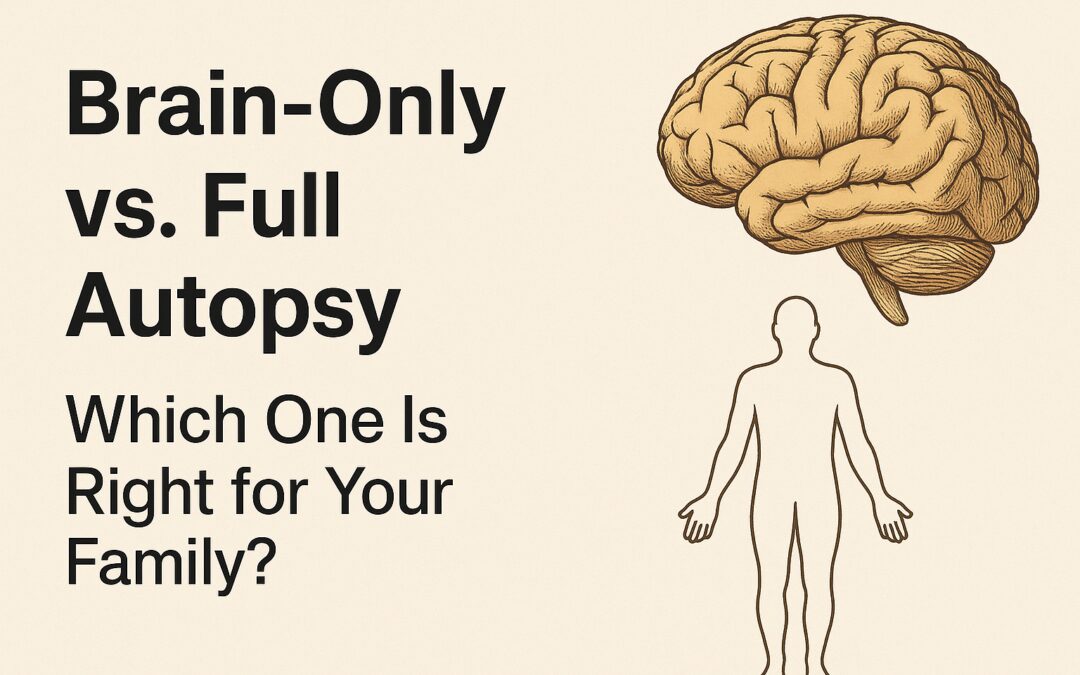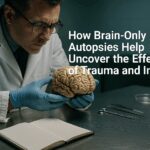When a loved one passes away, families often find themselves at a crossroads: should they choose a brain-only autopsy or a full autopsy? This decision carries deep emotional, medical, and sometimes legal implications. Understanding the difference between these two options is essential for making an informed choice during a difficult time.
Understanding Autopsy Options for Families
Autopsies serve one central purpose: to provide answers. Whether seeking closure, pursuing justice, or contributing to medical research, families have the right to explore the full range of postmortem services. Among the most common decisions is choosing between a brain-only autopsy and a full autopsy.
A brain-only autopsy—also known as a postmortem brain study or neuropathological autopsy—focuses exclusively on the examination of brain tissue. This specialized procedure helps confirm diagnoses of complex neurological conditions such as Alzheimer’s disease, Parkinson’s, dementia, and other neurodegenerative disorders. In contrast, a full autopsy—also called a whole body autopsy—examines all organs and body systems to determine the cause and manner of death.
What Is a Brain-Only Autopsy?
A brain-only autopsy involves the surgical removal and detailed analysis of the brain by a board-certified neuropathologist. This process provides insights into diseases that may not have been conclusively diagnosed during life. Given the high error rate in clinical diagnoses of neurological disorders, a brain autopsy is often the only way to achieve certainty.
Families usually consider a brain-only autopsy when:
- A loved one had a suspected but unconfirmed neurodegenerative disease.
- There is a family history of cognitive decline.
- They seek confirmation for research or genetic counseling purposes.
The benefits of this option include:
- Non-invasive appearance preservation, important for open-casket funerals.
- Definitive diagnosis for complex conditions.
- Genetic insights useful for surviving family members.
What Is a Full Autopsy?
A full autopsy includes examination of the entire body. A licensed, board-certified pathologist evaluates each major organ and tissue sample, documenting disease presence, progression, or absence. Full autopsies can uncover causes of death that were previously unknown or misunderstood.
Families may choose this option when:
- Death was sudden, unexpected, or unexplained.
- There are legal or insurance questions involved.
- Medical negligence or malpractice is suspected.
- A more thorough review of all organ systems is desired.
The benefits of a full autopsy include:
- Comprehensive understanding of the exact cause of death.
- Legal admissibility in court if litigation is involved.
- Family reassurance and medical validation.
- Clear documentation for insurance, hospital, or care-related disputes.
Brain Autopsy vs Full Autopsy: Which Fits Your Needs?
Choosing between a brain autopsy and a full autopsy depends on your specific goals. If the primary concern revolves around a possible brain disorder, a brain-only autopsy may be sufficient. However, if you suspect multiple causes of death or want a broad review of bodily systems, a full autopsy offers more detailed answers.
Here’s how they compare:
Understanding the Medical Autopsy Types
1800 Autopsy offers a comprehensive list of medical autopsy types:
- Private Autopsy: Requested by families, performed by clinical pathologists.
- Forensic Autopsy: Focuses on criminal or suspicious deaths.
- Partial/Limited Autopsy: Examines specific organs such as brain or lungs.
- Postmortem Neurological Diagnosis: Dedicated to neurological disorders.
All types are performed by licensed and insured professionals at 1800 Autopsy’s in-house morgue in La Crescenta, California. These services include full photographic documentation, storage of tissues for toxicology, and detailed autopsy reports.
Benefits of a Brain-Only Autopsy
Families often find that a brain-only autopsy balances depth and respect. It allows:
-
- Detailed analysis of Alzheimer’s, dementia, and Parkinson’s.
- Confirmation of diagnoses when blood tests and scans were inconclusive.
- Insight into hereditary risk factors.
- Participation in research studies or brain banks.
In some cases, families use this data to better understand their own health risks, including predispositions to neurological disorders. A neuropathological exam may support proactive care and family counseling.
Benefits of a Full Autopsy
Full autopsies offer:
-
-
- Complete organ and tissue evaluation.
- Documentation of underlying conditions like heart disease or cancer.
- Key evidence in malpractice or wrongful death claims.
- Insight into possible genetic conditions affecting the whole body.
-
Choosing a full autopsy can also strengthen your understanding of health history, offering medical clarity that can benefit family members for years to come.
When to Choose Brain-Only vs Full Autopsy
Here are scenarios to consider:
-
-
- Choose brain-only autopsy when neurological disease is the focus, especially if the rest of the body was well-documented in life.
- Choose full autopsy if you need comprehensive answers, suspect additional contributing factors, or are preparing for legal proceedings.
-
Families who want both neurological clarity and a systemic overview sometimes begin with a brain-only autopsy and later authorize a full autopsy based on findings.
Autopsy Decision Guide for Families
Making the right choice begins with your priorities:
-
-
-
- Are you seeking a specific diagnosis?
- Is legal clarity necessary?
- Are you concerned about funeral arrangements?
- Do you need the autopsy for hereditary insight?
-
-
Answering these questions can clarify the best fit for your family’s situation.
Understanding Autopsy Reports
Autopsy reports provide detailed conclusions about the findings. At 1800 Autopsy, reports include:
-
-
-
- Photographic evidence.
- Microscopic slide summaries.
- Pathology reports with diagnostic confirmation.
- Two-year storage for tissue samples and slides.
-
-
These reports are valuable for medical review, litigation, insurance claims, or long-term health planning for families.
Respectful, Insightful Choices
The loss of a loved one leaves many questions. Choosing the right postmortem exam—brain-only or full autopsy—can offer clarity, closure, and peace. 1800 Autopsy provides families with expert guidance, compassionate service, and timely results.
For compassionate assistance with your family’s needs, contact us at 1-800-AUTOPSY or visit our facility in La Crescenta, CA. Our team is available 24/7 to support you through your decision.
Whether you are facing uncertainty after a sudden death, need confirmation of a suspected condition, or are exploring hereditary health concerns, 1800 Autopsy is prepared to walk beside you. Our experienced team is trained to handle delicate situations with empathy and professionalism. We know that every family’s needs are unique, and our services are designed to provide meaningful answers without unnecessary intrusion. With over 30 years of proven expertise, our in-house facilities, board-certified pathologists, and around-the-clock availability ensure a seamless experience from consultation to final report. By choosing us, you are choosing clarity, respect, and the highest standard of care.
Take comfort in knowing you are not alone in making this important decision. We are committed to providing comprehensive support, timely communication, and trusted results, every step of the way. Our mission remains: to protect the deceased and give families the truth they need to heal, understand, and move forward.








